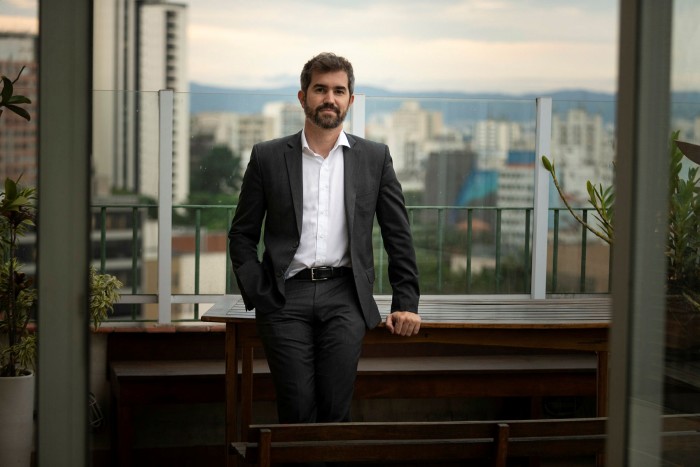New SBTi boss takes over as criticisms mount

Simply sign up to the Climate change myFT Digest -- delivered directly to your inbox.
Luiz Amaral was at his home in São Paulo when an email arrived with the news: the 40-year-old Brazilian had beaten more than 70 applicants to become the first chief executive of the Science Based Targets initiative, the influential arbiter of corporate climate change pledges.
It was an important move for Amaral, who has worked on environmental issues for more than a decade in the corporate and non-profit sectors, most recently at the World Resources Institute research group.
To celebrate, he had dinner with his wife and young daughter, who wanted to know exactly what he was going to do in the new job.
“It was very hard to explain to a six-year-old,” says Amaral, who ended up saying he was “trying to make the world a better place” by reducing the impact humans had on it.
This is indeed what the SBTi has been aiming to do since it was launched in 2015 by a handful of big environmental groups, including the World Resources Institute.
Yet, as Amaral has found since his appointment was announced in February, the endeavour has become increasingly complicated.
The idea behind the SBTi is simple enough. Encourage big companies — a large source of greenhouse gas emissions — to produce meaningful climate plans, not greenwashing public relations guff, by inviting them to submit their goals for validation.
The initiative’s experts assess the plans, for a fee, and approve those deemed to be in line with the 2015 Paris agreement, which aims to keep global warming well below 2C and ideally only 1.5C above pre-industrial levels (temperatures are already at 1.1C higher than they were before the Industrial Revolution triggered widespread use of fossil fuels).
The SBTi drew little attention at first, as it approved plans from many of the world’s best-known companies, including PepsiCo, Sony and Dell. But, as concern about climate change surged, so did its prominence — and its workload.
It has had more applications in the past 12 months than in all previous years combined and has now approved more than 1,300 company climate plans, up from 10 when it launched in 2015.
By the end of last year, the 2,200-plus companies that have either an approved target or a SBTi commitment accounted for more than a third of global market capitalisation.
“That’s what I like to call a good problem to have,” Amaral tells the FT.
“The work that we’re promoting has never been as important as it is right now.”

As the initiative’s influence has grown, however, so have questions about the accuracy of its ratings and the way it governs itself.
Some of the toughest criticism has come from other green outfits, such as the NewClimate Institute, a Germany-based advocacy group.
In a February report, it said the ratings SBTi awarded to some company plans were “highly contentious or inaccurate”. Some businesses had set targets using a baseline year when emissions were unusually high, so they did not have to do much to meet their goals, the report said. This raised questions about “whether it is realistic and valuable” to evaluate companies “without sufficient resources to conduct detailed investigations”.
Amaral says he welcomes positive criticism of efforts to translate complex science into real-world corporate climate targets. “We’re all trying to get to the same goals and having different sets of eyes making suggestions is absolutely needed,” he argues.
More stories from this report
Europe’s Climate Leaders 2022: interactive listing
Tech manufacturers wrestle with supply chain emissions
ISSB sets out to tighten up climate reporting
Carmakers embrace greener vision in wake of Dieselgate
Race to cut carbon emissions fuels climate tech boom
The carbon offset market is falling short. Here’s how to fix it
His colleagues add that SBTi analysis shows their work has an impact: Companies with approved targets are cutting emissions faster than their peers.
Some critics are unconvinced, though. Just after starting his new job, Amaral called Bill Baue, a US adviser on corporate sustainability involved with the SBTi in earlier days but now an outspoken detractor.
Baue has two chief complaints. First, he says the methods that the SBTi recommends companies use when setting targets do not include what research has found to be the most robust in cutting emissions. SBTi authors have published their own research challenging this claim.
Second, Baue argues that the SBTi programme faces a potential conflict of interest by charging companies fees to check whether climate plans meet the standards it sets. The SBTi says those fees are expected to account for only 20 to 25 per cent of total revenue in 2022. Baue says relying on validations for revenue is still a problem. “It leaves a subtle incentive to give a pass,” he tells the FT.
Baue says he appreciates Amaral’s engagement but is unsure it will lead to changes he thinks necessary, such as having an outside group, like a big accountancy firm, validate targets.
Change may be afoot. Amaral says that, although other standard-setting bodies have taken a similar approach to validation as SBTi, the initiative is working with consultants to reassess its governance model. It is also hiring a director who will handle formal complaints, including conflict of interest charges.
Meanwhile, the programme has ruffled feathers in the oil and gas industry by announcing that it will stop accepting climate plans from fossil fuel companies until it finalises contentious standards for the sector.
Amaral says that, while the initiative can always improve, some criticism inevitably comes with the territory. Many outsiders agree. Programmes like the SBTi’s had to be invented fast because there was such a need for them, says one London investor who relies on its ratings. Constructive criticism is needed, the investor adds. “But nobody ever said that they were going to be perfect overnight.”
Climate Capital

Where climate change meets business, markets and politics. Explore the FT’s coverage here.
Are you curious about the FT’s environmental sustainability commitments? Find out more about our science-based targets here
Comments